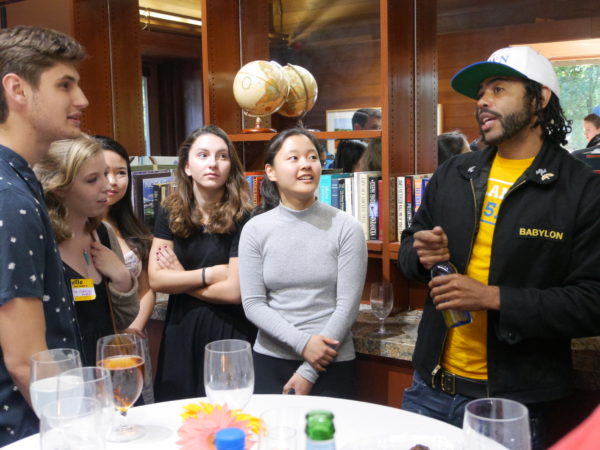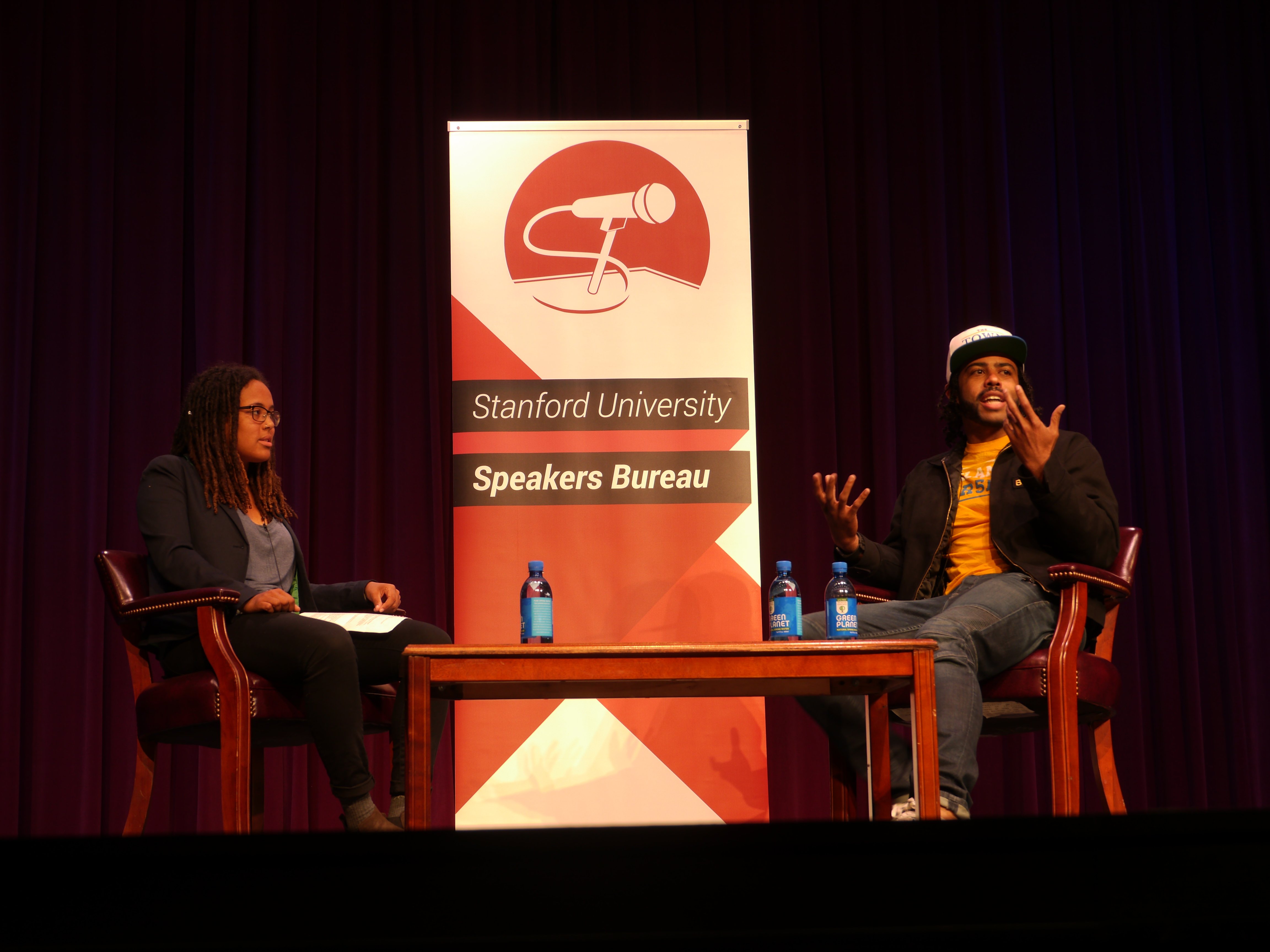“I call myself a nerd all the time,” said “Hamilton” superstar Daveed Diggs to Nerd Nation at Dinkenspiel Auditorium.
Last night, at an electrifying event hosted by the Stanford Speakers Bureau, the Tony and Grammy Award winning actor spoke with coolness, casualness and a refreshing candidness. On-point undergrad moderator Michelle McGhee ’18 superbly guided the discussion with Diggs through a variety of topics of great and moving import: his early life, acting career, involvement in Lin Manuel-Miranda’s brilliant show, and the good and the bad of hip-hop’s mainstreaming.
McGhee and Diggs kicked off the night with a picaresque rambling tour through Diggs’ early days. Playing up his Oakland heritage (“Everybody from the Bay has a superiority complex, because we’re dope”), Diggs took the room through a series of amazing twists-and-turns: his “crazy birth story” (he was born in two hospitals), his experience playing Charles Darwin at a production in Dink years ago (it wasn’t very good), his mother’s stint as a DJ in the ’70s and early ’80s, and her dropping out of college to go hitchhiking with a German Shepherd named Beowulf. (“That’s some Berkeley-ass shit.”) Throughout, his elegant storytelling skills kept the audience hanging on his every bon mot.
Where Diggs really struck home were his descriptions of culture shock at Brown University, his alma mater. “[There,] the standards for ‘Normal’ seem so restricted,” he said. When he visited Brown on an athlete recruiting trip, he noticed how every single black person greeted him with, “What’s up,” or “a complicated handshake.”
Diggs mused, “It wasn’t until I’d been there for several years when I realized: That’s what you do when you’re an endangered species,” to gasps, claps and snaps. For people of color coming from predominantly multiracial environments as Diggs did, to be transported to a liberal college campus comes at the risk of being shook at how much your color really pops out — in ways you didn’t think were relevant to you.
(This week, he plans to go to Brown to receive an honorary doctorate: “I asked if they would give it to me in engineering, and they said no.”)
Transitioning to “Hamilton,” Diggs described, in rich detail, how he came on board Miranda’s production, sparing no rod to our beloved Puerto Rican.
“I was emailed Lin’s fucking god-awful demos,” he says to great audience laughter. “Him rapping and singing every part. All those falsettos. Even still! It was so brilliant.”
What most impressed Diggs was Miranda’s ability to break the typical mediocrity of so-called hip-hop theater.
“‘Hip-hop theater’ usually means that something suffers,” he noted. “Either the hip-hop is not good, or the theater is not good. One of them is a misunderstanding. [“Hamilton”] was not that. Lin’s a really good rapper for real. He’s also a nerd about it.”
McGhee pressed Diggs on his thoughts on hip-hop entering an elite, predominantly white, mainstream space like Broadway — and what is won and lost in the move.
“That’s a tricky question, and something I’ve been struggling with a lot,” he said. “Hip-hop was indifferent to Broadway. We didn’t need Broadway, but I think Broadway needed hip-hop. It needed something contemporary. You know, Broadway in the ’30s and ’40s was using jazz music — genres on the cutting edge of popular music, on the same exposure level as Tin Pan Alley. So I think having the vocabulary of hip-hop [in Broadway] is like another tool in the toolbox for artists to use. It’s useful for the art form.”
When asked by McGhee on playing Thomas Jefferson, a slave owner, as a black man, Diggs was swift: “It was a trip.” But his answer proves that Diggs exudes the Black confidence, swagger and brilliance of the historically white men he plays in the show.
“I approached it the way I’d approach any character, which is trying to find real-life analogues in my own life. You discover he’s an incredible writer; it made sense to me, then, to make him a confident rapper. He was an incredibly curious person, inventing things all the time.
“He was also just insanely privileged — to a degree which I had never experienced, and don’t have any real-life analogues to it. I read once that his first memory was of being carried in a bassinet by one of his slaves. That was key to me. Being aware of the way that someone like that walks through the world. Creating a character who was as privileged as I could possibly imagine.”
Diggs went on to describe a key moment in Jefferson’s first appearance (“What’d I Miss?”), and how the staging worked to complicate the Jefferson of the show.
“Jefferson’s entrance is him literally being wheeled around on the stage by all his slaves. And they’re cleaning up the floor, scrubbing around him, stand in a straight line. No one talks about that, but that is what’s happening on stage.”

The conversation expanded beyond “Hamilton,” touching on Diggs’ recent spots on the TV show “Black-ish.” Diggs explained that he was brought in to fill in the gap of Millennial Blackness, “a version of Blackness that they weren’t exploring.” Diggs expressed shock when he was asked to reprise the role in another episode.
“I think I’m always waiting for someone to say ‘Psych!'” he said. The wave of laughter in the audience — some nervous, some not — was a wry counterpoint to that statement’s depth, pain and sting of truth.
On his massive success, the humbled Diggs said, “I get to say ‘no’ to a lot of things. That, for an artist, is crazy. You want to talk about privilege. I’m still getting used to it! I say ‘yes’ too way too many things. I feel nuts most of the time, running around and feeling like I’m doing too many things.
“I’m loving what I’m doing, don’t get me wrong. But I don’t believe that it will be there forever for me.”
Afterwards, the floor opened up to a question-and-answer session with the audience. He answered questions on his favorite rappers (E-40 of Vallejo and Aesop Rock) and his experience working on the Netflix sitcom “Unbreakable Kimmy Schmidt” (“Tina Fey is a national treasure”).
In response to a question from Victor Ragsdale ’19 on advice he would give to young black kids wanting to navigate the waters of Broadway and TV, Diggs was soul-stirring.
“Bring all of your self. Don’t leave any of your self home. Nobody wants you for what you think they want. Yes, Hollywood is racist and sexist. So is Broadway. So are all of these industries of art of which we are practitioners. That’s not your fault. You can’t change yourself to fit into their mold.
“As an actor, you spend a lot of time trying to figure out what the director wants from you. That’s not what people really want. It’s the most exciting thing in the world to interpret something that someone didn’t think of. Those people always get called back. You may not get the part, but you at least get called back and put on people’s radars.”
Asked on the state of hip-hop today, Diggs was fervently optimistic.
“I love it all. Obviously the underground is where I grew up. What’s really impressive is how weird everything mainstream is. Young Thug is a star — but his stuff is out there, avant-garde, wild.”
But then Diggs left the challenge to all of us, the next generation, to push art and thought to the next level. “I’m getting too old to be asked these questions. I don’t get to dictate what culture is anymore. I now get to watch what the kids create and be a fan of it.”
He encouraged open-mindedness of other artists’ work, regardless of political leaning or disagreements with mode of attack. “As a consumer, you get to say, ‘I don’t agree with this piece of art, so it’s not good.’ As an artist, I don’t think you get to do that. I think you have to explore the reasons you like or dislike something a little bit more than whether or not you agree with it.
“Just because an artist doesn’t align with me politically, that doesn’t give me any reason not to listen to them. Or to say that they’re bad outright. And if don’t like their ‘message,’ then it’s my job to put an alternative message out there.”
The Daily’s interview with Diggs will appear in tomorrow’s paper.
Contact Carlos Valladares at cvall96 ‘at’ stanford.edu.
